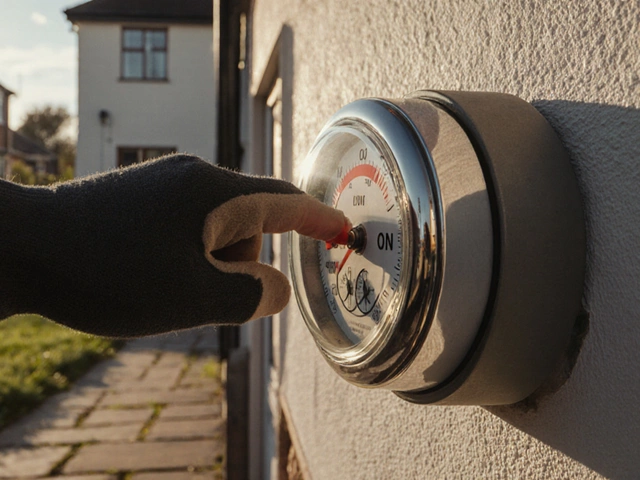When your boiler starts acting up, you feel the chill right away. A noisy pump, a cold shower, or a sudden rise in your energy bill are all red flags that something’s wrong. Ignoring those signs can turn a simple fix into a big, expensive repair. Below you’ll find the most common symptoms of boiler damage, easy steps you can try at home, and clear guidance on when to leave it to a qualified engineer.
First, pay attention to the noises. A knocking, rattling, or whistling sound often means there’s air trapped in the system, a loose part, or scaling inside the heat exchanger. Leaks are another giveaway – look for water pooling around the boiler or damp patches on walls and floors. If the pressure gauge is constantly low or spikes up, the pressure valve might be faulty. Finally, any odd smells, especially a rotten‑egg odor, point to a gas leak and need immediate professional attention.
Before you call anyone, try a few simple checks. Turn the system off, let it cool, and bleed the radiators to release trapped air. This often stops the knocking and brings the pressure back into the normal range. Next, check the condensate pipe; a blockage can cause the boiler to shut down. A quick clear‑out with a garden hose usually does the trick.
If the pressure is low, you can top it up using the filling loop – just follow the manufacturer’s instructions and watch the gauge move to the recommended level (usually 1.0–1.5 bar). Don’t over‑fill – that can cause more damage. Finally, make sure the thermostat is set correctly and that the timer isn’t accidentally switched off.
Some issues are best left to the experts. Persistent leaks, strange smells, or a boiler that won’t start after you’ve tried the above steps are clear signals to call a Gas Safe registered engineer. Also, if the heat exchanger shows signs of corrosion or the boiler is more than 10‑12 years old, a professional inspection can tell you whether repair or replacement makes sense.
Cost‑wise, a minor part replacement (like a valve or pump) usually runs under £150, while a full boiler replacement can be £2,000‑£4,000 depending on size and efficiency rating. Getting several quotes and checking the engineer’s credentials helps you avoid hidden fees.
Regular maintenance is the cheapest way to dodge major damage. An annual service checks the burner, controls, and safety devices, catching wear before it becomes a breakdown. It also keeps your boiler running efficiently, which saves on energy bills.
Remember, a properly maintained boiler not only keeps you warm but also reduces the risk of carbon monoxide exposure. If you ever suspect a gas leak, open windows, turn off the boiler, and call an emergency service right away.
Bottom line: watch for noises, leaks, and pressure changes, try the quick DIY fixes, and don’t hesitate to call a qualified engineer when the problem persists. Staying on top of these steps means fewer surprises, lower repair costs, and a cozy home all winter long.

Ever wonder if switching your boiler on and off harms it? This article unpacks how boilers handle frequent power cycles, what really wears them out, and when switching off could save you cash or cause problems. Find out the best ways to run your boiler for both safety and savings. Practical tips and real facts—all in plain English. Avoid costly repairs by knowing how to treat your boiler right.

An appliance technician plays a crucial role in keeping household and commercial appliances running smoothly. They diagnose issues, perform necessary repairs, and offer maintenance tips to prevent future problems. Understanding their responsibilities helps in appreciating their importance. This article provides insights into the day-to-day duties of an appliance technician and offers tips for those aspiring to join this field.

Dryers are workhorses in the laundry room, but they aren't immune to problems. This article breaks down the most common issues found in tumble dryers, from weird noises to clothes that just won't get dry. You'll find straightforward explanations for why these problems happen and learn some practical tips to fix or prevent them. Plus, get the inside scoop on when you should call for a pro. Save money, avoid headaches, and keep your dryer running smoother for longer.

If your freezer isn't doing its one job—keeping things cold—you're in a pickle. But before you start shopping for a new one, there are a few things you might try to get it back to work. From checking the power source to cleaning coils, fixing cooling problems can often be simple and straightforward. Let's explore some potential solutions to get your freezer chilling again.

Learn why all your gas appliances might stop working, how to safely troubleshoot common issues, and when to call a Gas Safe engineer.

Wondering how long it takes to swap out an old boiler for a new one? This article spells out exactly how much time you’ll need, what really affects the timeline, and offers practical tips to speed things up. Get the full breakdown, including what you can do before installation day and how to avoid surprises. If you want your heat and hot water back fast, this guide is for you. Find out what to expect from your boiler replacement and how to stay one step ahead.